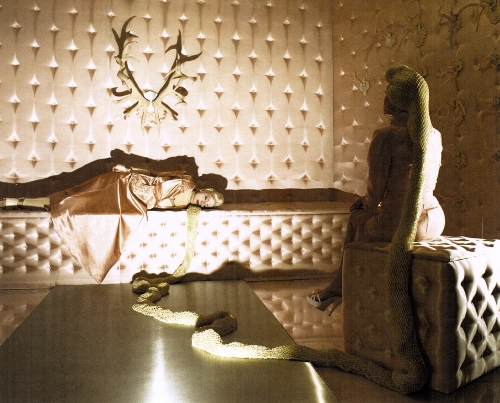Monoculture has been blamed for many of our environmental woes. It sets the scene for vulnerability to disease and pests on a grand scale. If the vulnerable crop falters, the resulting void cannot be filled since in the interim its cousin species have quietly disappeared due to lack of cultivation. Enter the Seed Savers. Working as volunteers under the radar, this worldwide community has been collecting, labelling and distributing endangered species seeds by a system of barter, rather like card collectors, and while they do not go around humming 'every seed is sacred' there is something messianic about what they do.
Hybrid World sets out to suggest that the humble artist in residence can be seen as a slingshot against one or two of the shadowy giants that allow countries to make war on each other, xenophobia and its partner ignorance. The forces of global trade, which create so much of the endemic inequity in the world, have ironically paved the way for increased global traffic in artists and intellectuals, the seed savers of society.
During 2003 and 2004 a series of intriguing events took place around Australia which are described in this issue. There were arts laboratories, experimenting with the breeding and propagation of new hybrids. There were gatherings from the south and the north, there was a sudden influx from all parts of Asia to Sydney. Asialink celebrated 35,000 days spent by Australians on Asian residencies since its establishment, exhibitions of Indigenous art were seen in Europe and Australian new media artists took their place at ISEA and Ars Electronica along with their long-time colleagues from elsewhere. Samstag scholars, and recipients of Australia Council and other residencies packed their bags and set off for the unknown. Others returned, with their lives changed and perhaps changing a few others on the way.
Ghassan Hage, at the Res Artis conference in August, spoke about the tendency for thinkers to be under constant pressure to 'get real', to 'wake up' to what is happening around them, and those who resist this 'reality' are either weak, stubborn or just don't know what's good for them. Allowing time for reflection and the imagining of better ways of doing things is patently not a thing to be encouraged by hierarchies of power. Ralph Nader characterised George W. Bush as 'a corporation disguised as a human being' and Corporate Academia, where thinkers are expected to raise money and be 'accountable' to business strategies, is clearly no longer a safe haven for dreaming Hage's 'mini-utopias'.
Residencies are chances to evade the pragmatists, to reflect and imagine the impossible and the possible. The hybridity of arts practice, and its unpredictable movement around the planet is an eloquent signal that strong plants can grow between the cracks.












